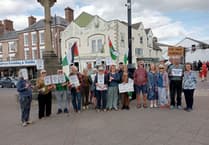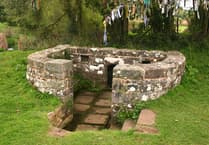The song, The Jovial Foresters has been described as the only surviving traditional song celebrating the Forest’s centuries-old coal mining industry. Although firmly about the Forest its origins are obscure.
Chorus
“For we are the Jovial Foresters,
Our trade is getting coal,
You never knew a Forester
But was a hearty soul.”
It was sung at many social events and annual dinners for workmen’s mutual help associations, like the beneficial club registered in 1766 at the Jovial Colliers Inn on Gloucester Road. After feasting came long speeches and toasts. Songs provided entertaining interludes.

The Jovial Foresters stresses the sociable nature of Foresters:
“Tho black we are when at our work,
You’d take us for some smoking man, When that is done,
We’re ripe for fun,
to laugh and chat with anyone.”
But it carries a warning to those who are disloyal:
“But he who undermines his friend
Is far more black than we.”
Solidarity and strong bonds are crucial for miners. Freeminer and Verderer, Rich Daniels explained this might refer to freeminers who broke ranks, perhaps underselling coal or selling gales to ‘foreigners’ (anyone born outside the Forest), thereby allowing those wealthy capitalists to capture much of the coalfield.
The anthem displayed the Foresters’ loyalty to King and Church:
“But we are true to church and King
Therefore let us merrily sing
That we are Jovial Foresters”
Who wrote the Jovial Foresters?
.jpeg?width=752&height=500&crop=752:500)
In 1901 Gloucestershire newspapers, reporting the illness and death of London music hall star Jolly John Nash, identified him as the song’s author and singer. Nash was its most famous performer. He inherited Oaken and Churchway Level Forest collieries, butbecame bankrupt and developed an alternative career. In 1864 he delighted his large Lydney audience with his Comic Album of mirth-provoking character-sketches.
“The Jovial Foresters was performed in full costume, with canteen, tommy-bag, candle-hose, a candle in his check cap, other working accoutrements and a wonderfully large loaf and pocket-knife. Before singing The Jovial Foresters, Mr Nash gave some Forest anecdotes with great drollery.”
Nash took the London music halls by storm. The song, however, has deeper roots and greater significance than Nash’s humorous portrayal of Forest folk.
Cheltenham printer Thomas Willey issued a copy of The Jovial Foresters between 1830 and 1861. His muddled words only approximated the early text, likely scribbled inaccurately from a singer. He shows, however, the song existed before Nash’s commercial use. The current text was published by Forest newspapers in 1925, using a version with music arranged by Cheltenham town band musician Joshua Hatton. Hatton died in 1855, so this text is earlier. “King” rhyming with “sing” is original, so the song must predate Victoria becoming queen in 1837.
In 1864, Rev Cornelius Witherby wrote an article about the Forest, probably using his Bream congregation’s knowledge. He identified the song as: “written some thirty years since by a Forester”, setting it in the early 1830s.
The earliest written evidence of the song is the news report about a dinner in January 1833 at Newnham’s Bear Inn (now, Passages House). “Gentlemen of influence” gathered to celebrate Parliament’s recent reform. After guest of honour Augustus Moreton MP toasted “the health of the Foresters and freeminers”, local solicitor John Lucas sang The Jovial Foresters.
Local historian Ian Wright uncovered, from the Cinderford Town Council Archive, a 1926 letter to the Dean Forest Mercury from Cinderford-born and bred, Alexander Pope (1863-1940). Pope had deep Forest roots and musical expertise. An old choir leader and bandmaster told Pope that the writer was William Trotter of Coleford in the 1840s.
.jpeg?width=752&height=500&crop=752:500)
In August 1840, local notables and numerous Foresters celebrated the opening of Coleford’s gas works with a dinner at the Angel Hotel. The Monmouth band played The Jovial Foresters. And William Trotter sang “the Foresters’ national song”.
Trotter’s shop was a well-known feature of Coleford’s town centre and the family played a big part in community and church life. Although “emphatically the Forester’s Friend”, William Trotter advised labourers in 1872 to “trust in God” rather than the delusions and snares of unions and “worthless agitators” or “fussy meddling legislation”.
The earliest report of the song involving those getting “black… when at our work” was from Ruardean Odd Fellows’ dinner in 1843. Amid speeches and toasts, local coalmaster Timothy Bennett, Mitcheldean’s remarkable philanthropist, sang The Jovial Foresters.
Deeper roots?
Folk expert Gwilym Davies attributed the song to a single educated author. The folk process involves multiple possibilities, including fragments and choruses circulating independently and Trotter adding or modifying verses.
Local historian, Roger Deeks, however, doubts Trotter’s authorship provides a terminus and seeks roots within Forest communities. Prototypes might exist within an oral tradition for storing and sharing ballads, established long before Trotter wrote down the song. Coleford’s Jovial Colliers was already a friendly society meeting house, characterising Foresters as jovial decades before Trotter was born. This anthem might have roots in miners’ friendly societies: it had continuing appeal within them throughout the nineteenth century. Such societies focussed on mutual aid, fraternity, and shared experiences of mining. Similarly, singing and music were expressions of their solidarity and comradeship.
Singing was popular entertainment and verse helped illiterate people memorise. Some might use The Jovial Foresters to affirm Foresters’ credentials as suitable citizens for voting rights; or, Ian Pope suggests, to protest against the turbulence around 1830.
President of the Freeminers Association, Jonathan Wright, champions Dean colliers as ultimate authors for The Jovial Foresters, claiming mid-eighteenth-century roots for this humorous drinking song. Such accurate portrayal of traditional Forest character implies an insider’s voice, rather than from bosses or patronising middle classes.
Predating the Industrial Revolution, the song celebrates miners meeting basic human needs for heating and cooking, with pride about their honest hard work (“none of them can work like us”!) While drinking, Foresters’ conversations about lawyers and doctors might refine and crystalise thoughts for the song.
In 1873 as five inebriated Soudley men tumbled home through Blakeney one Sunday, they were singing The Jovial Foresters. Only their subsequent disorder generated a newspaper report.
Ordinary Foresters embraced the song as their own, a proud affirmation of their self-identity and character. Whatever its ultimate origins, The Jovial Foresters had dynamic life in the Forest, at meetings, dinners, concerts, political rallies, friendly society meetings and everyday gatherings.
The New Regard Coleford Special is available from local outlets or online at https://forestofdeanhistory.org.uk




Comments
This article has no comments yet. Be the first to leave a comment.